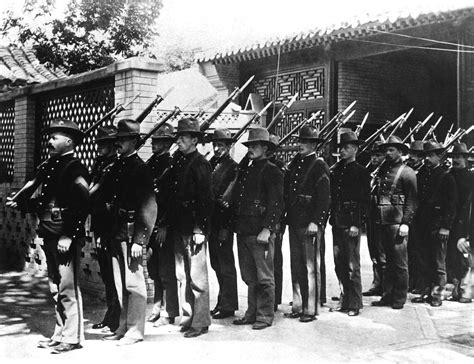The Boxer Rebellion, a pivotal event in late Qing dynasty China, was a complex and multifaceted uprising that shook the nation to its core. Sparked by a potent mix of nationalism, xenophobia, and social grievances, it left an enduring mark on China’s history and its relations with foreign powers.

Roots of the Rebellion
The late 19th century in China was a time of profound social, economic, and political turmoil. The influx of Western ideas and technologies, coupled with the Qing government’s perceived weakness and corruption, fueled a growing sense of resentment and nationalistic fervor among the Chinese populace. This sentiment was particularly strong in rural areas, where the harsh realities of poverty and foreign intrusion were keenly felt.
The “Boxers” and their Rise
Amid this atmosphere of discontent, a secret society emerged in the countryside of Shandong province. Known as the “Boxers” due to their practice of martial arts, they believed that they possessed supernatural powers to repel foreign influence and restore China to its former glory. The Boxers drew their membership from the ranks of peasants, artisans, and other disaffected groups, who were frustrated with the Qing government’s inability to protect them from foreign aggression.
Foreign Intervention and Violence
The Boxer Rebellion erupted in 1899, when Boxers began attacking Christian missionaries and foreign businesses in rural areas. As the violence spread, it took on a distinctly anti-foreign character, driven by a hatred of Western powers and their perceived encroachment on Chinese sovereignty.
Foreign governments, alarmed by the escalating violence, dispatched military forces to protect their interests. In 1900, an international expeditionary force, led by troops from Britain, France, Russia, Germany, and other nations, marched on Beijing to end the siege of the foreign legations. The intervention resulted in the deaths of thousands of Boxers and civilians, and the Qing government was forced to accept harsh peace terms that included indemnities and increased foreign influence in China.
Impact and Legacy
The Boxer Rebellion had a profound impact on China’s history and its relationship with the West.
-
Internal Losses: The rebellion caused widespread devastation and loss of life within China. Estimates suggest that up to 100,000 people were killed during the fighting, and countless more suffered from displacement, hunger, and disease. The Qing government’s authority was further weakened, and the country faced severe financial and diplomatic consequences.
-
Foreign Intervention: The suppression of the Boxer Rebellion marked a watershed moment in China’s relationship with the West. Foreign powers seized upon the opportunity to extend their influence in China, exploiting the Qing government’s weakness. This resulted in increased extraterritoriality, concessions, and economic control, which deepened resentment among the Chinese people.
-
Nationalism and Anti-Foreignism: The Boxer Rebellion became a symbol of Chinese nationalism and anti-foreignism. It served to galvanize Chinese people against perceived Western aggression and to inspire future resistance movements. The legacy of the rebellion continues to resonate in contemporary Chinese politics and society.
Lessons from the Boxer Rebellion
The Boxer Rebellion offers several important lessons for understanding the complex dynamics of social unrest and foreign intervention.
-
The Importance of Addressing Grievances: The rebellion was fueled by a potent mix of social, economic, and political grievances. Governments must proactively address these grievances to prevent them from erupting into violence.
-
The Dangers of Nationalism and Xenophobia: The Boxer Rebellion demonstrated the destructive power of extreme nationalism and xenophobia. When these forces take hold, they can lead to persecution, violence, and conflict.
-
The Need for Dialogue and Diplomacy: Foreign intervention, while sometimes necessary to protect lives, should be undertaken with the utmost caution and sensitivity. Diplomatic efforts and dialogue are essential to resolving conflicts peacefully and minimizing loss of life.
Conclusion
The Boxer Rebellion was a complex and tragic event that left a lasting impact on China and its relations with the West. Rooted in nationalism, xenophobia, and social grievances, it serves as a cautionary tale about the dangers of unchecked unrest and the importance of addressing underlying causes of conflict. The lessons learned from the Boxer Rebellion remain relevant today, as the world continues to face challenges of social unrest, nationalism, and foreign intervention.
